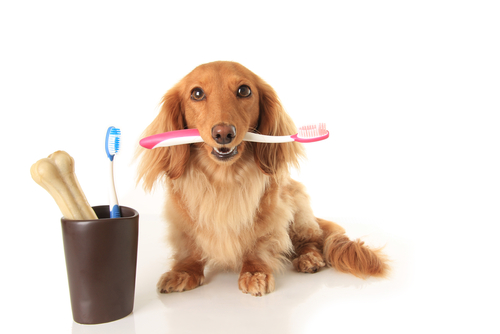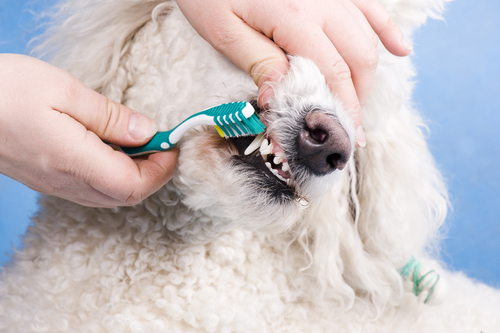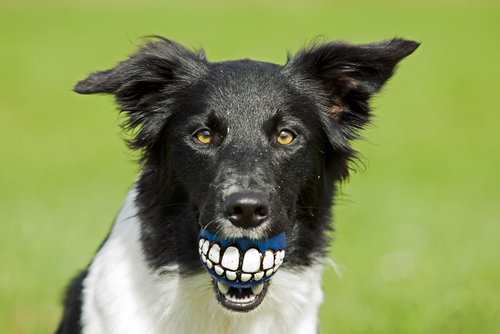
How To Get Your Dog To Sit Still For Dental Care
It really is crazy how parenting a dog has changed over the years. Twenty years ago, we had no idea dogs needed any dental care at all and now we know they need daily or at least weekly oral care to help keep them healthy. It can be a real struggle to fit in everything we need to do to keep our dogs health every week. But getting Fluffy to sit still for dental care, especially if it’s a new experience, is an entirely different struggle.

Why Dogs Need Dental Care
Most dogs eat the equivalent of a “fast food” diet, or worse. It truly is appalling what goes into most pet foods, and all those carbs, sugars, and additives can really take a toll on your dog’s teeth. They stick in his mouth. He has to drink a ton of water after eating just to wash it down. And his breath smells like death after a meal.
Just like people, dental conditions can affect your dog’s overall health, too. Gum disease can lead to organ damage and other health problems. Tooth decay results in tooth loss and pain. And an unhealthy mouth depletes your dog’s energy and affects his sleep. Keeping his mouth healthy helps keep him healthy.
And don’t get me started on doggie breath. I’ve met some dogs who’d make a crowd faint with just a few pants and an up-close encounter. Do you really want something that smells that bad in your baby’s face, or in your own? That horrible smell is a signal that something much more sinister is happening in your dog’s mouth- gum disease.
Gum disease is nearly inevitable in your fur babies unless you are diligent and intentional about making dental care a priority. Your dog needs daily, weekly, and yearly dental care to stay healthy.
- Daily treatment of bad doggie breath and prevention of the formation of new tartar
- Weekly removal of plaque buildup to infection and cavities
- Yearly professional inspection and/or cleaning to prevent gum disease
All three of these steps are necessary to keep your dog’s mouth healthy.
But what do you do when you dog has other ideas when it comes time to brush his teeth?
Tips for Getting Your Dog to Sit Still for Dental Care

If you have kids, what would you do if your two year old refused to brush his teeth? Would you just let him go weeks without brushing? Would you give in after one scrub of the toothbrush and let him go back to playing with his favorite toys to keep him happy? No, you’d find a way to make brushing fun or at least tolerable and you’d keep after him everyday to brush his teeth- because it’s important for his health.
Then why do we, as pet parents, let our dogs get away with refusing to brush?
We know that neglecting dental care leads to gum disease. We know that neglecting regular brushing leads to tooth loss. And we intentionally choose that fate for our dogs when we don’t teach them to be tolerant of dental care. Sounds harsh, doesn’t it? Just like receiving vaccinations, getting nails clipped, and taking a bath- sometimes staying healthy isn’t pleasant or comfortable for our fur babies, but we do it because we love them.

You can help your dog learn to tolerate dental care, but there is one crucial factor- YOU!
- Your attitude toward doggie dental care determines your dog’s attitude. If you hesitate, himhaw, or appear halfhearted in your attempts at brushing your dog’s teeth, he’s going to take your cues and struggle. You must remain calm, assertive, and persistent. Let him know from the start that dental care is essential, not optional.
- Reward him well. Yummy dog treats that won’t contribute to gum disease are often the way to any dog’s heart, and if you reward him well during and after dental care, he’ll soon learn that a slightly unpleasant task results in some pretty sweet rewards if he cooperates. Like a child who’s promised a lollipop if he swallows an unpleasant medicine, your dog is likely to learn that it’s not as bad as he once thought. In fact, in time he’ll learn to associate the sight of that toothbrush or dental spray with the rewards that are soon to come and he’ll be excited for his daily brushings.
- Educate yourself. If you don’t know how to care for a dog’s mouth, you could accidentally gag him or stab him with the brush on accident. If you’re new or nervous, try starting out with a doggie dental gel and a washcloth or gauze pad instead of a toothbrush. Know what to look for when inspecting your dog’s mouth and call your veterinarian or hygienist at the first sign of tooth decay or gum disease.
video to embed:
4. Make it fun. Rewards don’t just come in treat bags. Your dog wants your affection and attention and a fun game of ball after dental care may be his favorite kind of reward. If you stick to a routine, he’ll learn that sitting still for dental care for two minute results in twenty minutes of playtime immediately after.
5. Don’t be afraid to ask for help. If you’re struggling to care for your dog’s teeth, ask your veterinarian or a trusted dog groomer for help. Sometimes watching someone with lots of confidence and knowledge can help you learn new doggie parenting skills.

+ There are no comments
Add yours